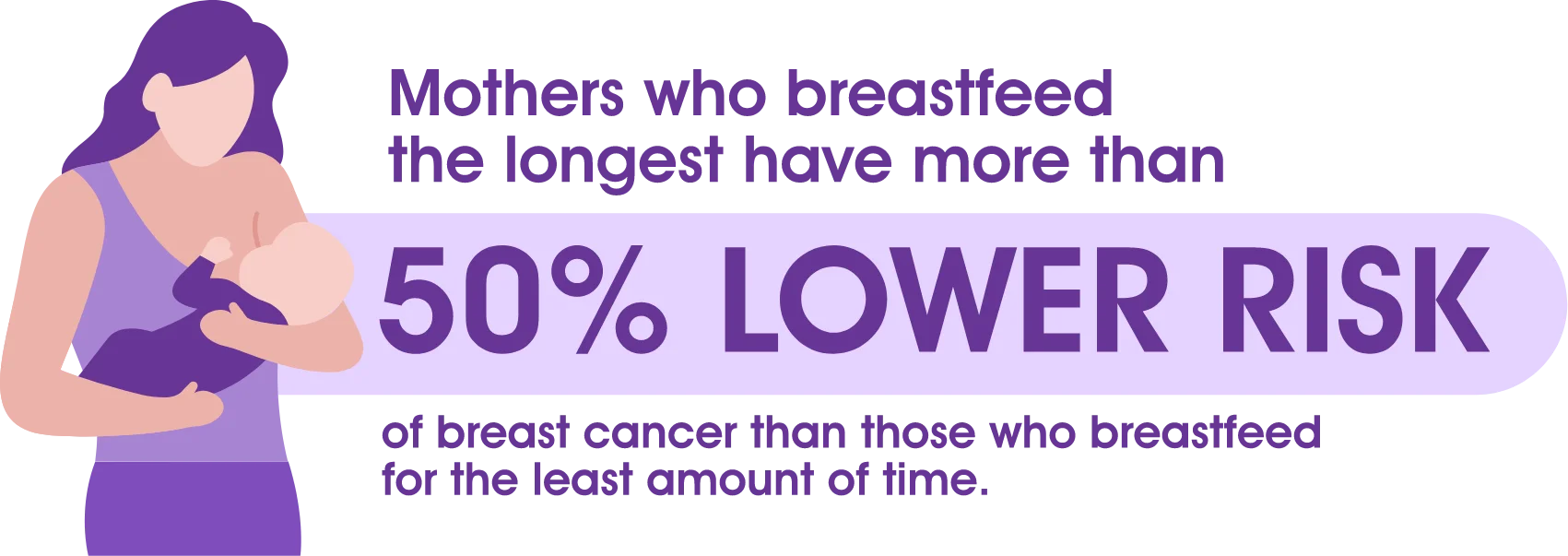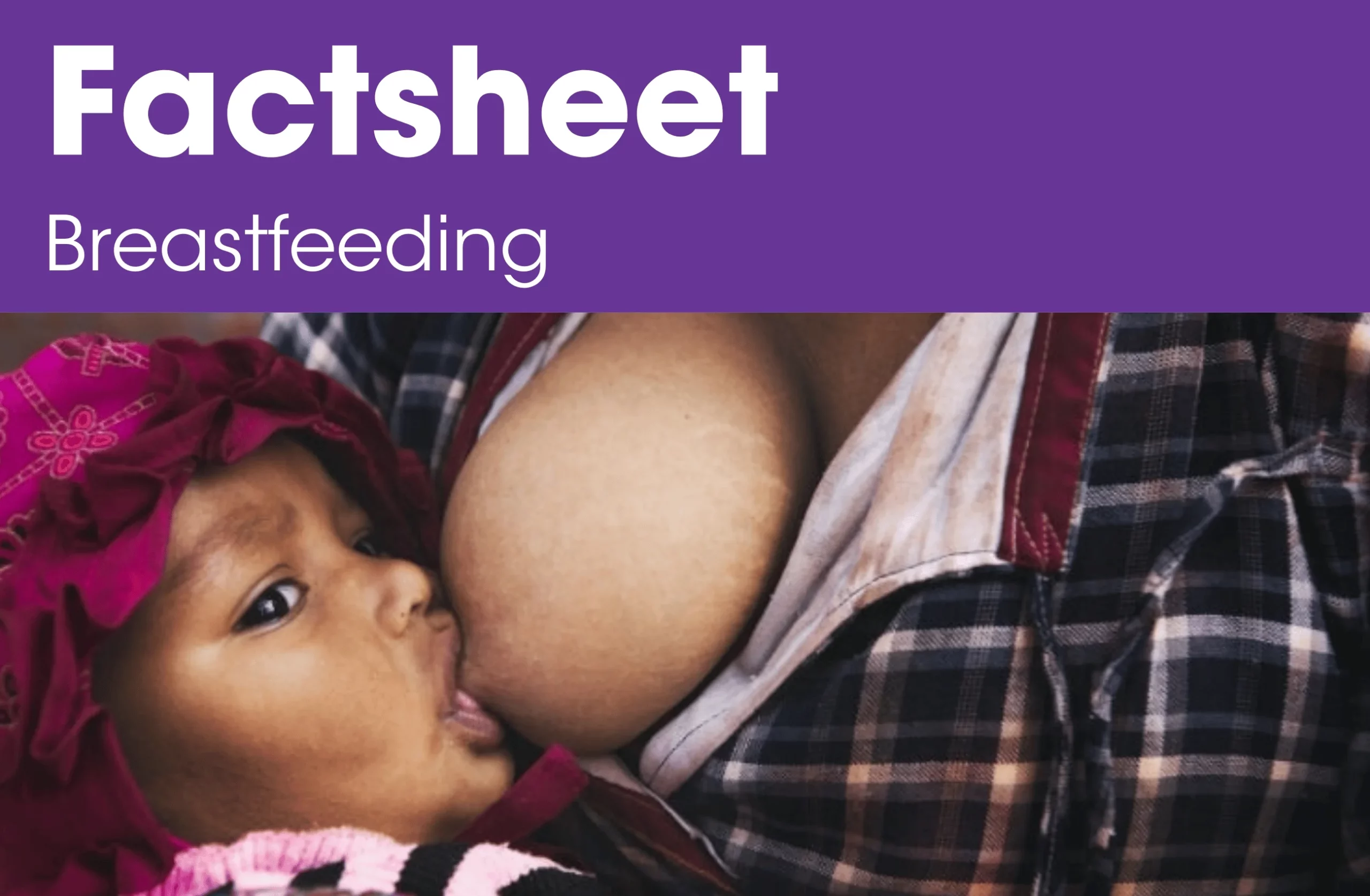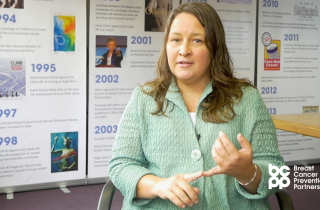Breastfeeding
Breastfeeding
Breastfeeding protects mothers against all types of breast cancer because it causes protective physiological changes in the breast. The longer one breastfeeds, the greater the protective benefit.Science Summary
Breastfeeding includes combination feeding where a mother breastfeeds and bottle feeds. The more we can do to create social, cultural, and economic factors that support as many mothers as possible to breastfeed, the better our community’s breast health outcomes will be.

What can I do for my own body and health?
If you have the choice and the ability, plan to breastfeed for as long as you can. You can choose to exclusively breastfeed or use combination feeding, where you both breastfeed and bottle feed. If you are facing barriers to breastfeeding, such as a lack of medical, occupational, social, and cultural acceptance, we can work on shifting these systemic obstacles together.
What can I do to support the health of my family and friends, and my community?
Talk to your friends and family, especially to those expecting a newborn, and share information with them about the health benefits of breastfeeding. When planning a gathering or outing, ensure there is a safe space for mothers who may need to pump or breastfeed.
How can I navigate and get support with any systemic barriers to my health?
Black women and other marginalized groups may face more barriers to breastfeeding because of inadequate support from healthcare providers and unsupportive work environments. Many women still face a lack of social and cultural acceptance in their communities, as well.
The greatest disparities were found in practices supporting early breastfeeding initiation, limited use of breastfeeding supplements, and rooming (allowing mother and child to stay in the same room). In addition, different populations have different breastfeeding support needs.
Although this list is not exhaustive, particular attention should be paid to the needs of mothers in the following communities:
- Women of Color, with different needs among various cultures and socioeconomic groups
- LGBTQ and Gender Queer people
- Mothers with Disabilities
- Women in Jail, Prison, and Immigrant Detention
- Young Mothers
- Low-Income Women
When possible, choose hospitals that provide breastfeeding support and services. Look up your local or state government breastfeeding support programs, which could include consultations, classes, support groups, supplies, etc.
We can enact laws to address and support a mother’s right to breastfeed her child! Examples include the federal law which now requires employers to provide reasonable break time and a safe place for an employee to express breast milk for her nursing child for one year. California law extends these protections to any employee for as long as the employee is nursing her child.
How can I help advocate for and support systemic change to remove barriers to health?
There’s a lot that we can do together to remove legal, cultural, and societal barriers that stop women from breastfeeding. Here are some ways to get involved at the systems level:

Take part in and share public education campaigns that promote breastfeeding and provide information on its health benefits for both child and mother.

Write to your representative, advocating for support policies (like paid leave and more comprehensive medical plans) for pregnant women and new mothers. When paid leave is not provided, women are forced to return to work and thus may not be able to breastfeed for as long as they want. One study found that 19.5% of Black mothers reported returning to work as a reason to stop breastfeeding, compared to 8.8% of White mothers.

Ask your workplace to ensure that it is breastfeeding-supportive for all workers, especially if your sector faces unique challenges (for example, farmworkers).

Request that healthcare facilities implement or improve their breastfeeding-supportive practices and breastfeeding-support materials for women, before and after birth.
Despite the scientific evidence that breastfeeding is beneficial to women’s health, many personal decisions and factors contribute to whether or not women breastfeed. While all efforts should be made to support breastfeeding, no woman should be made to feel ashamed for how she feeds her baby.
Resources

Chapter Pullout

Supported by grant funding from Gilead Sciences, Inc. Gilead Sciences, Inc. has had no input into the development or content of these materials.
Types: Fact Sheet, Report





